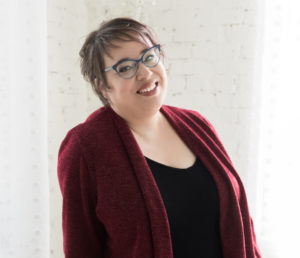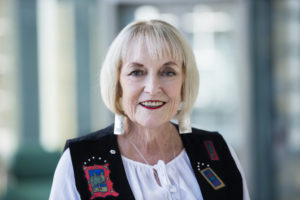November 11, 2022
The Call for Proposals for the 2023 Library Publishing Forum is closed.
Program
Monday, May 8
12:00 p.m. to 1 p.m. | Keynote address by Dorothea Salo, Distinguished Teaching Faculty III in the University of Wisconsin at Madison’s Information School
She Can’t Say That, Can She?  [video]
[video]
1 p.m. to 1:15 p.m. | Break
1:15 p.m. to 2:15 p.m.
FULL SESSION
A Continuum of Library Publishing in Music: First-time Musical Score Publishing to Establishing a Music Label  [video]
[video]
Anita Walz, Assistant Director of Open Education and Scholarly Communication Librarian, Virginia Tech; Kindred Grey, OER and Graphic Design Specialist, Virginia Tech; Derek Shapiro, Director of Bands and Assistant Professor of Music, Virginia Tech; Jonathan Caldwell, Director of Bands and Assistant Professor of Conducting, University of North Carolina at Greensboro; Kathleen DeLaurenti, Director of the Peabody Institute of the Arthur Friedheim Music Library, Johns Hopkins University
PANEL
Law Library Faculty Publication Services  [video]
[video]
Liz Parker, Publication Services Librarian, Legal Research Center, University of San Diego School of Law; Sasha Nunez, Research Assistant, Legal Research Center, University of San Diego School of Law
The Pittsburgh Novel: An Interactive Bibliography 3 Years in the Making  [video] [slides]
[video] [slides]
Angel Peterson, Open Publishing Production Specialist, Penn State University
Turning Gray Literature into Gold  [video]
[video]
Zoe Wake Hyde, Community Development Manager for Humanities Commons, Michigan State University
2:15 p.m. to 2:45 p.m. | Break
2:45 p.m. to 3:45 p.m.
ACTIVE SESSION
Let’s Chat! How Do You Support Student Journals to be Sustainable and Ongoing? [materials]
Kristin Hoffmann, Research & Scholarly Communication Librarian, Western University; Emily Carlisle-Johnston, Research and Scholarly Communication Librarian, Western University; Noah Churchill-Baird, MLIS Student, Western University
FULL SESSION
A Model for Diversifying and Expanding Digital Publishing: Brown University Library’s National Endowment for the Humanities Institute  [video]
[video]
Allison Levy, Director, Brown University Digital Publications; Cosette Bruhns Alonso, Contemporary Publishing Fellow, University of Pennsylvania Libraries & Penn Press (LPC DEI Committee Member, 2022-2024); Emily Lynell Edwards, Assistant Professor of Digital Humanities and Educational Technologist, St. Francis College; Warren Harding, Postdoctoral Research Associate, Diversity in Digital Publishing, Brown University; Ashley Robertson Preston, Assistant Professor of History, Howard University
3:45 p.m. to 4:00 p.m. | Break
4:00 p.m. to 5:00 p.m.
Get to know your keynotes!, led by Jason Boczar
A relaxed opportunity after the first day of the 2023 Library Publishing Forum to converse with our keynote speakers Dorothea Salo and Deborah Poff. This will be an informal session to ask questions, start conversations, and discuss topics related to library publishing and the expertise of this year’s keynotes.
Tuesday, May 9
12:00 p.m. to 1:00 p.m.
ACTIVE SESSION
A Toolkit for Disability Equity in Scholarly Communications  [video]
[video]
Karen Stoll Farrell, Head of Scholarly Communication, Indiana University – Bloomington; Simon Holt, Head of Central Strategies, Content Acquisition at Elsevier; Erin Osborne-Martin, Associate Director, Strategic Analytics at Wiley; Sylvia Hunter, Marketing Manager at Inera
NOTE: Because attendance for this session is capped at 40, attendees must “purchase” a free ticket when registering in Eventbrite.
PANEL
A Fresh Take on JATS: Book Reviews as a Simple, Immediate, and Accessible Gateway to Full-Text Publishing
Matthew Vaughn, Open Publishing Librarian, Indiana University; Richard Higgins, Software Engineer, Indiana University
Curing Law Review Link Rot with DOIs  [video]
[video]
Valeri Craigle, Head of Technical Services, James E. Faust Law Library, University of Utah
Thoth: Open and Trusted Metadata for Open Access Books and Book Chapters  [video] [slides]
[video] [slides]
Rupert Gatti, Fellow, Trinity College, Cambridge
1:00 p.m. to 1:15 p.m. | Break
1:15 p.m. to 2:15 p.m.
ACTIVE SESSION
Collaborative Administration of DIY Publishing Tools  [video]
[video]
Corinne Guimont, Digital Scholarship Coordinator, Virginia Tech; Caitlin Bean, Publishing Services Specialist, Virginia Tech; Anita Walz, Assistant Director of Open Education and Scholarly Communication Librarian, Virginia Tech
FULL SESSION
Consortium Models for Open Education Resource Publishing  [video]
[video]
John D. Morgenstern, Copyright and Scholarly Communications Librarian, Emory University; Jeff Gallant, Program Director, Affordable Learning Georgia; Ellan Jenkinson, Member Engagement & Training Librarian, Partnership Among South Carolina Academic Libraries; BJ Robinson, Director, University of North Georgia Press; Yang Wu, Open Education Resources Librarian, Clemson University
2:15 p.m. to 2:45 p.m. | Break
2:45 p.m. to 3:45 p.m.
PANEL
Listening to Our Community: What Does DEI in Library Publishing Look Like to You?  [video]
[video]
Shannon Kipphut-Smith, Scholarly Communications Liaison, Rice University
The Gender Gap in Job Status and Career Development of Chinese Publishing Practitioners  [video]
[video]
Yawen Li, School of Journalism and Communication, Beijing Normal University
Reintroducing the Ethical Framework for Library Publishing, V2.0  [video]
[video]
Joshua Neds-Fox, Coordinator for Library Publishing, Wayne State University Library System
FULL SESSION
Building a Publishing Platform Crosswalk: A Documentation Month Case Study  [video]
[video]
Corinne Guimont, Digital Scholarship Coordinator, Virginia Tech; Cheryl E. Ball, Independent Consultant; Matthew Vaughn, Indiana University
3:45 to 4:00 p.m. | Break
4:00 p.m. to 5:00 p.m.
Let your heart sing!, led by Lucinda Johnston [slides]
A social time following the day’s main presentations during which you’ll be guided through some creative arts activities to help you decompress from the day’s activities and prepare for the morrow. (No actual singing required! But do bring to the session pens/pencils/pastels/paints … and paper, or any other artsy/crafty materials that you will feel comfortable working with.)
Lucinda Johnston (MLIS, MTA) is Liaison Instructional Librarian at the University of Alberta, and also a Certified Music Therapist. She contributes regularly to staff and student health and wellness initiatives at the U of A.
Wednesday, May 10
12:00 p.m. to 1:00 p.m.
ACTIVE SESSION
Book Usage Metric Sharing and Use Guardrails: Developing Ethical Principles and System Requirements to Protect Reader Privacy and Automate Multi-Publisher and Platform OA Book Usage Data Exchange and Aggregation  [video]
[video]
Ursula Rabar, OA Book Usage Data Trust Community Manager, OPERAS (Open Scholarly Communication in the European Research Area for Social Sciences and Humanities)
PANEL
Stronger Together: The Growth of Open Access Library Hosting in Scotland  [video]
[video]
Rebecca Wojturska, Open Access Publishing Officer, University of Edinburgh
Canada’s Library Publishers: Low-Key Load-Bearing  [video]
[video]
Mike Nason, Open Scholarship & Publishing Librarian, UNB Libraries; Sonya Betz, Head, Library Publishing and Digital Production Services, University of Alberta; Emma Uhl, Publishing Support Specialist, Public Knowledge Project
Scottish Universities Press: Collaborating across Scotland to Develop a Library-Led Open Access Press  [video]
[video]
Dominique Walker, Publishing Officer, Scottish Universities Press
1:00 p.m. to 1:15 p.m. | Break
1:15 p.m. to 2:15 p.m.
PANEL
Staffing and Services in Library Publishing Programs: A Data-Driven Report
Johanna Meetz, Publishing & Repository Services Librarian, Ohio State University; Jeff Story, Senior Software Engineer, Intel Corporation
Creating a Publishing Preservation Policy  [video]
[video]
Corinne Guimont, Digital Scholarship Coordinator, Virginia Tech
Connecting Institutional Repositories and University Presses to Open and Preserve Humanities and Social Sciences Scholarship  [video]
[video]
Annie Johnson, Associate University Librarian, University of Delaware; Alicia Pucci, Scholarly Communications Associate, Temple University
FULL SESSION
New Data Sharing Mandates and the Role of Academic Libraries  [video]
[video]
Michael Casp, J&J Editorial; Emma Molls, Publishing Services Librarian, University of Minnesota Libraries; Sarah Lippincott, Head of Community Engagement, Dryad; Alberto Pepe, Authorea
2:15 p.m. to 2:45 p.m. | Break
2:45 p.m. to 3:45 p.m.
FULL SESSION
Practice What You Preach: A Conversation about Transparent Publishing with the Journal of Open Educational Resources in Higher Education  [video]
[video]
Kristina Clement, Editor in Chief of the Journal of Open Educational Resources in Higher Education (Student Outreach & Sponsored Programs Librarian, Kennesaw State University; Hilary Baribeau, Managing Editor of the Journal of Open Educational Resources in Higher Education (Scholarly Communication Librarian at-Large); Casey McCoy-Simmons, author of “OER State Policy Discourse: Adding Equity to the Cost Savings Conversation” from the first issue of the Journal of Open Educational Resources in Higher Education (PhD Candidate in Higher Education at the University of Denver); (Moderator) Chelsee Dickson, Associate Editor for Innovative Practices, Columns, & Reviews for the Journal of Open Educational Resources in Higher Education (Scholarly Communications Librarian, Kennesaw State University)
PANEL
Academy Owned Scholarly Publishing at the Big Ten Academic Alliance  [video]
[video]
Kate McCready, BTAA Visiting Program Officer for Academy Owned Scholarly Publishing, Big Ten Academic Alliance + University of Minnesota Libraries
The Role of Library Publishing in Making Non-Traditional Research Outputs Count  [video]
[video]
Christie Hurrell, Director, Lab NEXT, University of Calgary; Robyn Hall, Scholarly Communications Librarian, MacEwan University
Ethics, Epistemology, and Scholarly Communication: How Epistemic Injustice Emerges throughout the Scholarly Communication Lifecycle  [video] [slides]
[video] [slides]
Emily Cox, Collections & Research Librarian for Humanities, Social Sciences, & Digital Media, NC State University
3:45 to 4:00 p.m. | Break
4:00 p.m. to 5:00 p.m.
Sacred Ecology – Embodied Presence & The Miracle of Breath, led by Rheanna Chen [slides]
A cozy and nourishing time following the day’s main presentations during which you’ll be guided through some somatic breath and bodywork to pause and explore your inner and outer landscape. A safe space to explore and share together as we disconnect from the noise and reconnect to presence. Come as you are.
Rheanna Chen is a yoga and mindfulness practitioner the last 17 years. Combined with her studies in plants, ecology and regenerative food systems, she is most fascinated by their impact on the human experience. Her joy is sharing everyday, simple tools to increase awareness for individual and collective healing and transformation.
Thursday, May 11
12:00 p.m. to 1:00 p.m. | Keynote address by Deborah Poff, retired Professor of Philosophy and Senior Academic Administrator
The State of Play in Current Major Forms of Deception in Publishing: Predatory Publishing, Paper Mills and ChatGPT  [video] [Five questions]
[video] [Five questions]
1:00 p.m. to 1:15 p.m. | Break
1:15 p.m. to 2:15 p.m.
PANEL
When Does Your OER Program Become a Library Publishing Program?  [video]
[video]
Stephanie Western, OER Program Manager, Utah State University Libraries; Becky Thoms, Head of Digital Initiatives, Utah State University Libraries; Erica Finch, Scholarly Communications Librarian, Utah State University Libraries
Indexing of Student Journals: Barriers and Opportunities for Discoverability  [video] [slides]
[video] [slides]
Mariya Maistrovskaya, Digital Publishing Librarian, University of Toronto Libraries
Going Wayback: Digitally Preserving a Defunct Student Journal  [video] [slides] [speaker notes]
[video] [slides] [speaker notes]
Noah Churchill-Baird, MLIS Student, Western University; Kristin Hoffmann, Research and Scholarly Communication Librarian, Western University; Emily Carlisle-Johnston, Research and Scholarly Communication Librarian, Western University
FULL SESSION
Making Beautiful Books and Articles: Lowering the Costs of Open Access and OER Publishing via Automated Typesetting  [video] [slides]
[video] [slides]
Dione Mentis, Coko Foundation COO; Christina Tromp, Ketida Project Manager; , Paged.js Developer; Julien Taquet, Paged.js Developer; Karen Lauritsen, Open Education Network, Publishing Director
2:15 p.m. to 2:45 p.m. | Break
2:45 p.m. to 3:45 p.m.
ACTIVE SESSION
Discovering, Using, and Getting Involved with the Library Publishing Curriculum
John W. Warren, Director and Associate Professor, Publishing, MPS in Publishing, George Washington University; Johanna Meetz, Publishing & Repository Services Librarian, Assistant Professor, Ohio State University
PANEL
Metadata for Everyone: Identifying Metadata Quality Issues across Cultures  [video] [slides]
[video] [slides]
Julie Shi, Digital Preservation Librarian, Scholars Portal
Puppies as a Veneer for Cheering Genocide: How Should a Press React When an Accepted Manuscript is Problematic?
Abram Shalom Himelstein, Editor-in-Chief, University of New Orleans Press; Chelsey Shannon, Editor, University of New Orleans Press
3:45 to 4:00 p.m. | Break
4:00 p.m. to 5:00 p.m.
Collaborative Meaning-Making Happy Hour, led by Melanie Schlosser
To wrap up the 2023 Library Publishing Forum, we will have an informal social hour to discuss sessions that resonated with us. Whether it was a particular keynote or individual presentation, let’s talk about what’s happening in Library Publishing and where we can go from here. Bring your favorite beverage (and snacks!) and join the conversation.

 Dorothea Salo
Dorothea Salo Deborah Poff
Deborah Poff